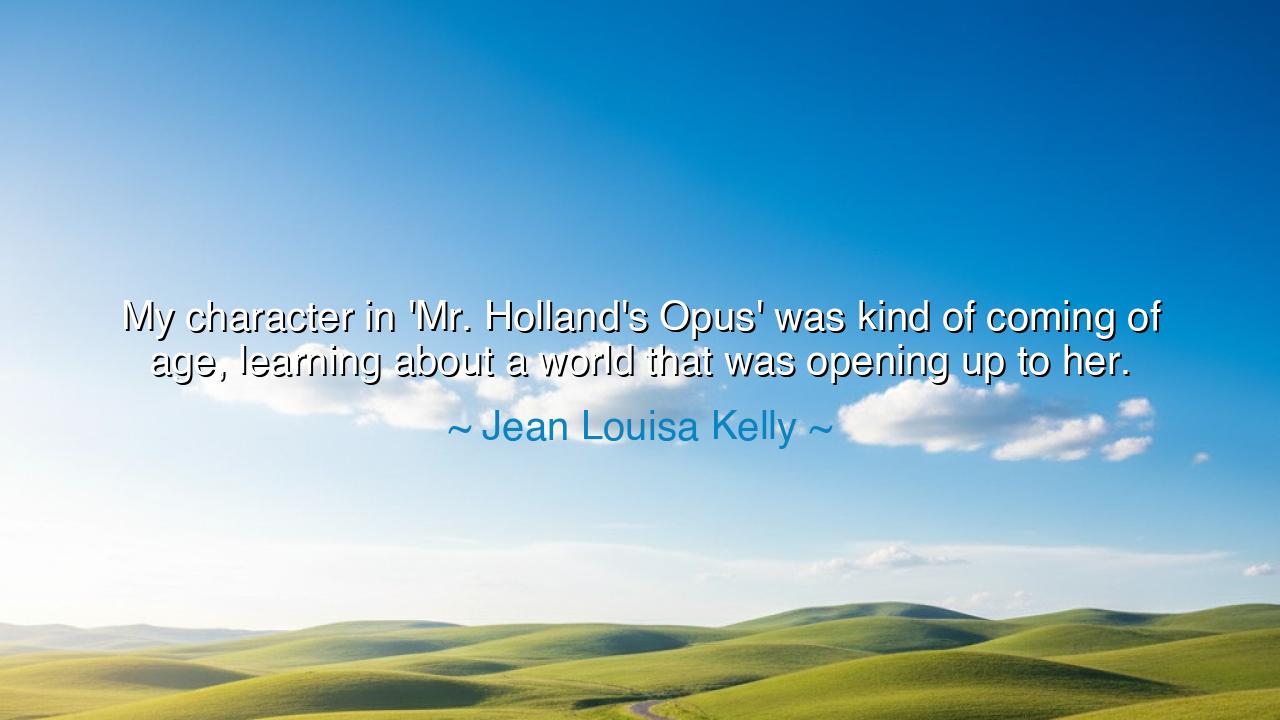
My character in 'Mr. Holland's Opus' was kind of coming of age
My character in 'Mr. Holland's Opus' was kind of coming of age, learning about a world that was opening up to her.






The words of Jean Louisa Kelly—“My character in ‘Mr. Holland’s Opus’ was kind of coming of age, learning about a world that was opening up to her.”—speak softly yet profoundly about the sacred transformation of youth into understanding. In this reflection, she does not merely describe a role in a film, but touches upon one of the most timeless passages of the human journey: the awakening of the soul to the vastness of life. To “come of age” is not only to grow older; it is to see the world anew, to recognize that beyond the small garden of childhood lies a horizon of complexity, beauty, and choice. Kelly’s words, though simple, echo an eternal truth known to all who have crossed from innocence into wisdom—that life, once opened, can never again be unseen.
In Mr. Holland’s Opus, Kelly’s character embodies this awakening through the power of music—that universal language of the heart that transcends age, culture, and understanding. Under the guidance of her teacher, she learns not just to sing, but to feel, to perceive the hidden melodies of the human experience. Her world opens like a flower to light, and she stands on the threshold between the safety of youth and the call of destiny. Such a transformation mirrors what every generation must endure: the shedding of simplicity, the confrontation with emotion, and the discovery that life’s beauty often comes twinned with its sorrow. Kelly’s reflection, therefore, is not only about art—it is about the moment when one’s heart first meets the world in full.
The ancients called this passage the dawn of consciousness, a moment celebrated in myths and poetry. Think of Persephone, daughter of Demeter, who wandered through the meadows of her youth until she was drawn into the underworld, there to learn of shadow and return transformed. Or of Telemachus, the son of Odysseus, who began as a boy of hesitation and doubt, but through hardship and discovery became a man capable of meeting his father’s gaze. In each tale, the pattern is the same: innocence encounters experience, and through struggle, a new self is born. So too, in Kelly’s words, we hear the echo of this universal rhythm—that to truly grow, one must first be opened by the world.
It is not an easy passage. To awaken is to be vulnerable, for the first light of understanding can dazzle and wound at once. The young heart, unguarded and eager, learns that beauty coexists with disappointment, that love carries risk, and that mastery requires humility. Yet it is through this vulnerability that true strength is forged. Just as a musician must play wrong notes before creating harmony, so must every soul falter before it finds its own rhythm. Kelly’s character, like all who come of age, does not merely discover the world—she discovers herself reflected in it, a mirror of the infinite complexity she once could not see.
History, too, offers countless mirrors of this awakening. Consider Marie Curie, who as a young woman left her homeland of Poland for France, uncertain, poor, and alone. The world that opened to her was filled with both brilliance and danger—brilliance in discovery, danger in the invisible forces of radiation that would one day take her life. Yet through that journey, she learned the truth that every seeker must face: that to learn is to risk, and to open one’s mind to the world is to invite both wonder and consequence. Like Kelly’s character, Curie’s awakening was both external and internal—an encounter with the world’s vastness and the self’s boundless potential.
Kelly’s words also carry a deeper wisdom for the elders who hear them: that growth never truly ends. The world continues to open itself, again and again, to those willing to look beyond the familiar. “Coming of age” is not confined to the young—it is a state of courage, an openness to discovery that one must carry through every season of life. To cease learning is to grow old in spirit; to remain curious is to remain forever young. Thus, the journey of her character becomes a mirror for us all, urging us never to close our hearts, no matter how many seasons we have lived through.
Let this truth then be the lesson: when the world opens to you, do not shrink from it. Do not fear the immensity of its possibilities, nor the pain of its lessons. For every soul, young or old, must one day stand at the edge of the unknown and choose to step forward. To come of age, in the truest sense, is not to abandon innocence, but to refine it into wisdom—to see the world not as a place of threat, but as a vast symphony waiting to be played.
So, my listener, remember this: keep your heart open to the world’s music. Like Jean Louisa Kelly’s character, let yourself be taught by experience, moved by wonder, and changed by truth. For the world is forever opening, and each of us, no matter our years, is forever coming of age.






AAdministratorAdministrator
Welcome, honored guests. Please leave a comment, we will respond soon